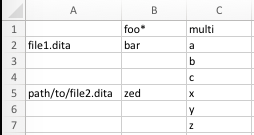Setting Metadata
tdsync tool has an extensible mechanism for loading the metadata
associated with files being synced. By default, it can load metadata from a JSON file,
from a
CSV file, or from metadata artifacts generated from certain Content Management System
exports.
Custom metadata drivers can be implemented in Java.The metadataLoader configuration setting supports three values by default.
- json
- This is the default metadata loader. It loads metadata from the
HARP-META/metadata.jsonfile, if present. - csv
- This loader will look for
HARP-META/metadata.csv, and load metadata from that file, if present. - sdl
- This loader will look for companion files to the files being synced with the same
name
but an extension of
.MET, as exported by some SDL content management systems.
A custom metadata loader can be specified by using its fully-qualified Java class name.
JSON Metadata Loader
If you download a zip archive from a project or folder using the Titania Delivery
admin UI,
you'll notice that the downloaded archive contains a file called
HARP-META/metadata.json. This file contains all of the user-specified
metadata for the files included in the archive. The JSON metadata loader will include
the
metadata specified by this file.
The structure in this file is a mapping of file paths (optionally including a fragment identifier) to arrays of Metadata values. Each metadata entry has a key, an array of String values, and a boolean field indicating whether the metadata field should cascade.
If the filename includes a fragment identifier (a "#", followed by a string
representing a meaningful fragment identifier for a location or region within the
document),
the metadata will be associated with the fragment, and will be merged with the
document-level metadata for searching. Fragment metadata entries should include the
special
metadata name, _td.fragmentLabel, to supply a readable display label for
the fragment. Fragment metadata may be used for navigating to specific locations in
a
document, when displayed in a portal viewer.
{
"/file1.dita": [
{"name": "foo", "value": ["bar"], "cascades": true},
{"name": "multi", "value": ["a", "b", "c"], "cascades": false}
],
"/path/to/file2.dita": [
{"name": "foo", "value": ["zed"], "cascades": true},
{"name": "multi", "value": ["x", "y", "z"], "cascades": false}
],
"/path/to/file3.pdf#page=12": [
{"name": "about", "value": ["Dopey", "Sneezy"]},
{"name": "_td.fragmentLabel", "value" ["Page 12"]}
]
}
This loader takes no parameters.
CSV Metadata Loader
This metadata loader reads file metadata from metadata.csv. The first
column in the file must contain the relative path to the file. The first row names
the
metadata fields. A metadata name ending with an asterisk (*) indicates that its values
should cascade; the asterisk is not included in the metadata name. Multiple values
for a
field can be represented by additional rows in the CSV structure.

Fragment metadata within a file may be indicated by appending "#" and a
meaningful identifier for a location or region in the document. Each fragment should
include
a value for the special metadata name, _td.fragmentLabel, to supply a
readable display label for the fragment.

This loader can take the following parameters.
metadataLoader.csvFile- The relative path to the CSV file.
metadata.csvby default. metadataLoader.csvEncoding- The character encoding of the CSV file, Uses the platform's default encoding by default.
metadataLoader.csvFormat- There is no one standard CSV format. This parameter specifies the "flavor" of CSV
for
the file. Valid values are as follows.
EXCEL(the default)TDF(for tab-delimited format)RFC4180
SDL Metadata Loader
SDL content management offerings can include the metadata associated with documents
when
they are exported from the system, encoded in files with the same name as the files
to which
they apply, with .MET on the end. These files contain an XML structure
describing the metadata for the file. The SDL metadata loader will read those files
and
apply the metadata to the file when syncing.
The behavior of this loader can be configured using a separate XML file specifying, among other things, which metadata to include and exclude, mappings from SDL metadata names to Titania Delivery metadata names, and which metadata do and do not cascade.
<metadata-config> <!-- Omit metadata not listed in this file; cascade by default --> <defaults omit="false" cascades="true" includeEmptyValues="fale"/> <field name="FOO" tdname="foo" cascades="true"/> <field name="MULTI" tdname="multi" cascades="false"/> </metadata-config>
The full DTD definition for this configuration file would be as follows.
<!ELEMENT metadata-config (defaults?, field*)> <!ELEMENT defaults EMPTY> <!ATTLIST defaults omit (true|false) 'false' cascades (true|false) 'true' > <!ELEMENT field EMPTY> <!ATTLIST field name CDATA #REQUIRED tdname CDATA #IMPLIED omit (true|false) 'false' cascades (true|false) #IMPLIED >
The configuration file is specified via the metadataLoader.configFile
configuration parameter.
The SDL Metadata Loader does not support fragment metadata.
Custom Metadata Loaders
Custom metadata loaders can be implemented in Java by any class that implements the
com.titania.harp.client.tdsync.MetadataDriver interface. See the
apidocs in the Client Connector distribution for full documentation
of this interface. Place the JAR file or files containing any custom implementation,
along
with any dependencies, into the lib directory of the Client Connector
distribution to make it available.